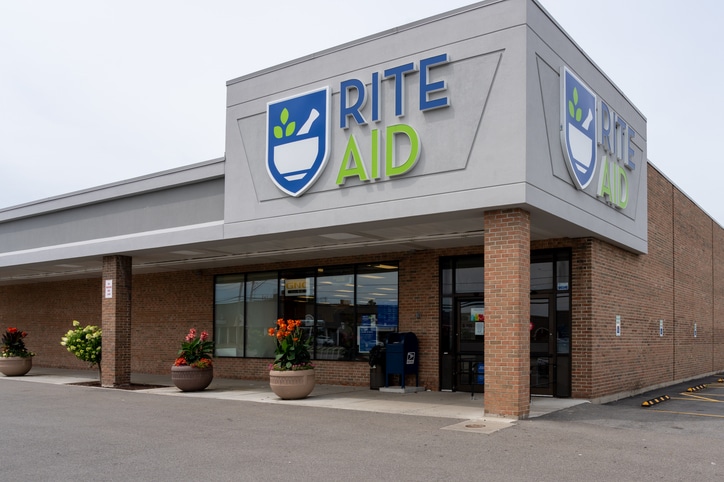On July 10, the U.S. Department of Justice (DOJ) announced two False Claims Act (FCA) settlements with Rite Aid Corporation and various subsidiaries and affiliates. The settlements, both of which resolve qui tam whistleblower lawsuits, concerned allegations that the pharmacy giant violated the FCA by falsely reporting rebates and by billing federal healthcare programs for unlawful prescriptions for controlled substances.
$101 Million Settlement over Allegations of Falsely Reporting Rebates
Rite Aid and Rite Aid subsidiaries, Elixir Insurance Company, RX Options LLC and RX Solutions LLC agreed to pay the government $101 million to settle the allegations of falsely reporting rebates. The subsidiaries also agreed to grant the United States an allowed, unsubordinated, general unsecured claim for a total of $20 million in Rite Aid’s pending bankruptcy case.
The allegations concerned Medicare Part D, where private sponsors offer and administer insurance plans providing prescription drug coverage to enrolled Medicare beneficiaries. Under Medicare Part D, sponsors must inform the Centers for Medicare and Medicaid Services (CMS) of any rebates or renumeration the plans received. This allows the government to receive the benefit of any price concessions provided by drug manufacturers.
According to the government, Rite Aid and its subsidiaries “improperly reported to CMS portions of rebates received from manufacturers as bona fide service fees, even though manufacturers did not negotiate with the defendants to pay such fees.”
“Rite Aid and its Elixir subsidiaries lined their corporate pockets with millions of dollars of manufacturer rebates that should have been reported to Medicare,” said U.S. Attorney Rebecca C. Lutzko for the Northern District of Ohio. “Each of those dollars could have been used to benefit Americans with genuine health care needs. Our office will not tolerate deceptive health-insurance practices, and we will vigorously pursue those who violate the FCA.”
The settlement stems from a qui tam whistleblower lawsuit filed by Glenn Rzeszutko, a former employee of RX Options. Under the FCA’s qui tam provisions, individuals may file suits on behalf of the government alleging violations of the FCA. If a qui tam suit results in a successful settlement, the whistleblower is eligible to receive between 10-30% of the government’s recoveries.
$7.5 Million Settlement over Allegations Related to Opioid Dispensing
Rite Aid and ten subsidiaries and affiliates agreed to pay $7.5 million and grant the government an allowed, unsubordinated, general unsecured claim of $401.8 million in Rite Aid’s pending bankruptcy case to settle allegations of violating both the FCA and Controlled Substances Act (CSA) by knowingly dispensing unlawful prescriptions for controlled substances and seeking reimbursements for these prescriptions under federal healthcare programs.
According to the government, “from May 2014 through June 2019, Rite Aid knowingly dispensed at least hundreds of thousands of unlawful prescriptions for controlled substances that (1) lacked a legitimate medical purpose and were not issued in the usual course of professional practice and/or (2) were not valid prescriptions, were not for a medically accepted indication or were medically unnecessary.”
“Filling unnecessary prescriptions for powerful and addictive opioids, as the government alleged here, not only takes a toll on our communities, but also violates the law,” said Principal Deputy Assistant Attorney General Brian M. Boynton, head of the Justice Department’s Civil Division. “As today’s settlement illustrates, the Justice Department is committed to holding pharmacies accountable for their role in the nation’s opioid crisis.”
The case resolves a qui tam lawsuit filed by Andrew White, Mark Rosenberg and Ann Wegelin, who all previously worked for Rite Aid at various pharmacies. The whistleblowers will receive 17% of the government’s recovery as their share of the settlement.
False Claims Amendments Act of 2023
On July 25, a bipartisan group of senators introduced the False Claims Amendments Act of 2023, which address a few technical loopholes undermining the success of the FCA. The bill is widely supported by whistleblower advocates.
National Whistleblower Center (NWC) has issued an Action Alert calling on Congress to pass the bill.
Join NWC in Taking Action:
Demand that Congress strengthen the False Claims Act
Further Reading:
Bipartisan Legislation Unveiled to Strengthen False Claims Act
